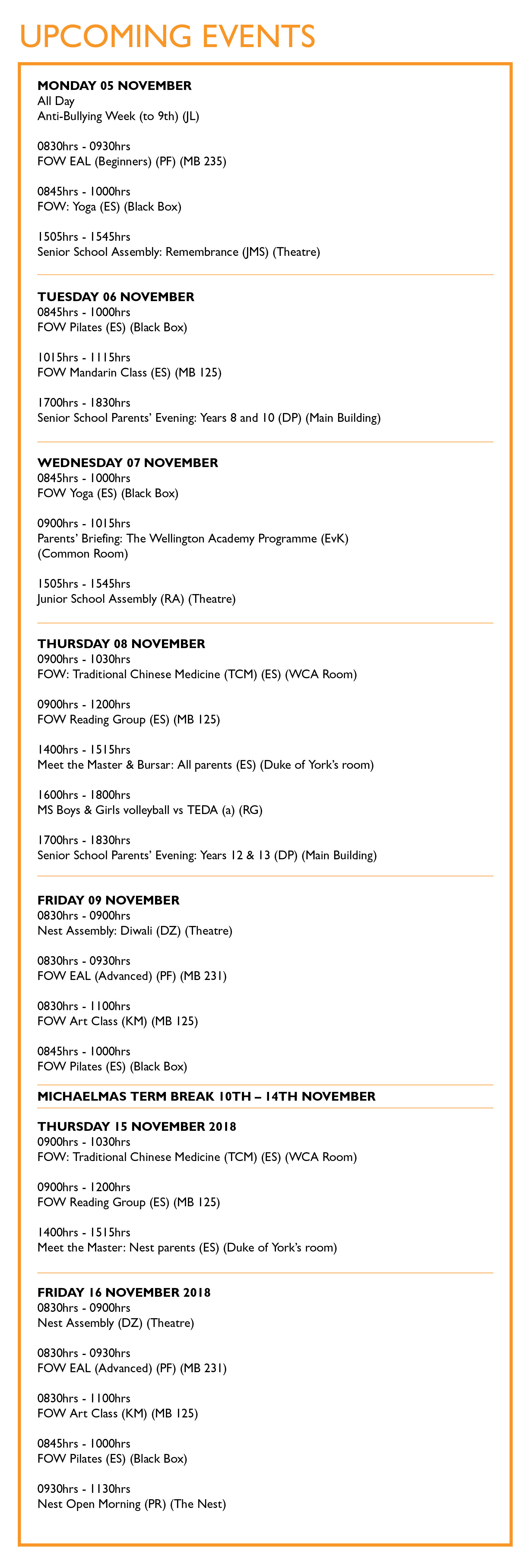The Week Ahead 2 November 2018
05 Nov 2018

 Remembrance
Have you forgotten yet?...
For the world's events have rumbled on since those gagged days,
Like traffic checked a while at the crossing of city ways:
And the haunted gap in your mind has filled with thoughts that flow
Like clouds in the lit heavens of life; and you're a man reprieved to go,
Taking your peaceful share of Time, with joy to spare.
But the past is just the same—and War's a bloody game...
Have you forgotten yet?...
Look down and swear by the slain of the War that you'll never forget.
From Aftermath by Siegfried Sassoon
The coming week brings with it the build-up to the annual observance of Remembrance Day. This is the name given to the one day in the year on which countries in across the world mark to ‘remember’ their dead of all the wars since 1914. In Britain, as well as Canada, South Africa, India, Australia and New Zealand, it is on the 11th November. This date was chosen as it was on the 11th November 1918 that the fighting of the First World War ended. At the moment the guns stopped firing – 11 o’clock in the morning on the 11th day of the 11th month - people from all over these countries stand in silence for two minutes to remember those who have given their lives for their countries. This year marks the 100th anniversary of the armistice, and with it the end of the fighting in the First World War.
Wellington College suffered grievous losses in the wars of the 20th Century. In total, 725 old boys, teachers and school employees were killed between 1914-18, with a further 594 in the Second World War: if you were going to observe a minute’s silence for each of them, you would be mute for 22 hours.
But remembrance is not just about Wellington, or Britain, or any individual nation; it is about all those who served and those they left behind. We use the opportunity to reflect on the individual sacrifices made by men and women across the conflicts of the past 100 years, but also to make a shared commitment to work towards a peaceful world. The verse from the poem at the head of this piece was written by a soldier and poet of the Great War, perhaps Britain’s most famous chronicler of the experience of warfare, Siegfried Sassoon. Initially enthusiastic about war, even being awarded a medal for his conspicuous gallantry in battle, Sassoon grew disillusioned by the horror of war and wrote more and more poetry attacking the belligerent mentality of politicians and commanders. He humanised the conflict in terms that those who had not experienced it first-hand could understand, and his determination to make sure the sacrifice of the ‘ordinary’ soldier was never forgotten, means his work is as relevant today as it was in 1918. In essence, his message is that his generation fought so that others would know better, as long as they remembered.
This is what our school community will be marking this week; as ‘the world's events have rumbled on since those gagged days’, we work with our pupils to ensure that, even across a span of 100 years, time does not dim the message of the horror and futility of conflict. Through the work of the History department and others to raise awareness of remembrance, and to keep alive Sassoon’s message of never forgetting, our pupils can develop a more profound understanding of the need to avoid repeating the mistakes of the past. In school, and across the world, the acts of remembrance this week are therefore not ones of triumph, nor a misguided glorification of militarism, but rather offer all of us time for individual reflection and the renewal of our shared commitment to peace between nations.
Parents who wish to learn more about the school’s observance of remembrance are welcome to attend the special assembly on Monday at 1505hrs in the Theatre. The organisers ask that parents be seated towards the back of the auditorium by 1500hrs at the latest.
Best wishes
Julian Jeffrey
MASTER
Remembrance
Have you forgotten yet?...
For the world's events have rumbled on since those gagged days,
Like traffic checked a while at the crossing of city ways:
And the haunted gap in your mind has filled with thoughts that flow
Like clouds in the lit heavens of life; and you're a man reprieved to go,
Taking your peaceful share of Time, with joy to spare.
But the past is just the same—and War's a bloody game...
Have you forgotten yet?...
Look down and swear by the slain of the War that you'll never forget.
From Aftermath by Siegfried Sassoon
The coming week brings with it the build-up to the annual observance of Remembrance Day. This is the name given to the one day in the year on which countries in across the world mark to ‘remember’ their dead of all the wars since 1914. In Britain, as well as Canada, South Africa, India, Australia and New Zealand, it is on the 11th November. This date was chosen as it was on the 11th November 1918 that the fighting of the First World War ended. At the moment the guns stopped firing – 11 o’clock in the morning on the 11th day of the 11th month - people from all over these countries stand in silence for two minutes to remember those who have given their lives for their countries. This year marks the 100th anniversary of the armistice, and with it the end of the fighting in the First World War.
Wellington College suffered grievous losses in the wars of the 20th Century. In total, 725 old boys, teachers and school employees were killed between 1914-18, with a further 594 in the Second World War: if you were going to observe a minute’s silence for each of them, you would be mute for 22 hours.
But remembrance is not just about Wellington, or Britain, or any individual nation; it is about all those who served and those they left behind. We use the opportunity to reflect on the individual sacrifices made by men and women across the conflicts of the past 100 years, but also to make a shared commitment to work towards a peaceful world. The verse from the poem at the head of this piece was written by a soldier and poet of the Great War, perhaps Britain’s most famous chronicler of the experience of warfare, Siegfried Sassoon. Initially enthusiastic about war, even being awarded a medal for his conspicuous gallantry in battle, Sassoon grew disillusioned by the horror of war and wrote more and more poetry attacking the belligerent mentality of politicians and commanders. He humanised the conflict in terms that those who had not experienced it first-hand could understand, and his determination to make sure the sacrifice of the ‘ordinary’ soldier was never forgotten, means his work is as relevant today as it was in 1918. In essence, his message is that his generation fought so that others would know better, as long as they remembered.
This is what our school community will be marking this week; as ‘the world's events have rumbled on since those gagged days’, we work with our pupils to ensure that, even across a span of 100 years, time does not dim the message of the horror and futility of conflict. Through the work of the History department and others to raise awareness of remembrance, and to keep alive Sassoon’s message of never forgetting, our pupils can develop a more profound understanding of the need to avoid repeating the mistakes of the past. In school, and across the world, the acts of remembrance this week are therefore not ones of triumph, nor a misguided glorification of militarism, but rather offer all of us time for individual reflection and the renewal of our shared commitment to peace between nations.
Parents who wish to learn more about the school’s observance of remembrance are welcome to attend the special assembly on Monday at 1505hrs in the Theatre. The organisers ask that parents be seated towards the back of the auditorium by 1500hrs at the latest.
Best wishes
Julian Jeffrey
MASTER



- Talk about another – if the hearer needs to know the information; the words are truthful; and the words are positive.
- Controlling your mouth is the first step to controlling your mind.
- Just as a runner trains for a marathon, we can train ourselves toward generosity of spirit by practising compassion in our daily lives.






Related Articles

The Week Ahead 9 November 201826 Nov 2018
Dear Parents I discovered this week that the world of psychology has an unofficial new term: nomophobia. Studies in Britain have identified a growing trend among young people for a novel form of anxi
Read More

The Week Ahead 23 November 201826 Nov 2018
Dear Parents You may have spotted that we have in school three young interns from the UK. For those of you not yet lucky enough to have had dealings with these outstanding young people, I would like
Read More

The Week Ahead 25 January 201928 Jan 2019
Dear parents As we are on the verge of the school’s New Year holiday, I thought I would take this chance to look forward to the second ‘half’ of the term and pick out a few highlights for our communi
Read More





 Channel
Channel 
 Linkedin
Linkedin  Facebook
Facebook  Ins
Ins 


